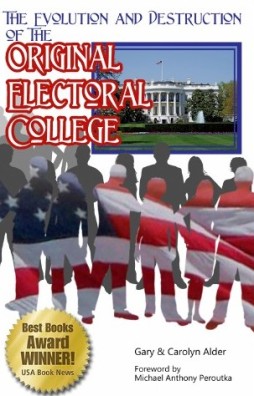A Page from Our Book
Page 74 – Opposition to the 12th Amendment
In examining the 1803 debate in the Senate concerning the 12th Amendment, we find that some of the Senators understood the electoral system as set up by Article II of the Constitution and were loath to change anything without a thorough study and analysis of the effects of those changes. Other Senators either did not understand the American constitutional paradigm as it relates to choosing the President, or had some interest in changing the system for their own ends.
Samuel White from Delaware in defending the original Constitution said, “we have not given it a fair experiment,” and “we should be cautious how we touch it”:
What appears specious in theory, may prove very inconvenient and embarrassing in practice, and my objections go to any alteration of the Constitution at this time; we have not given it a fair experiment, and it augurs not well to the peace and happiness of the United States to see so much increasing discontent upon this subject, so many projected alterations to the great charter of our Union and our liberties; not less than four are now upon our tables, and which, if adopted, will materially change the most valuable features of the Constitution. …
… Are we aware of what we are about? Is this the way in which the Constitution was formed? Was it put together with as much facility and as little reflection as we are tearing it to pieces? No, Mr. President, it was constructed after much thought, after long and mature deliberation, by the collected wisdom and patriotism of America, by such a set of men as I fear this country will never again see assembled; and we should be cautious how we touch it. (The Founders’ Constitution vol. 5 p. 457)
William Plumer from New Hampshire pointed out that the original Constitution protects the interest of the small states:
This amendment affects the relative interest and importance of the smaller States. The Constitution requires the Electors of each State to vote for two men, one of whom to be President of the United States. This affords a degree of security to the small States against the views and ambition of the large States. It gives them weight and influence in the choice. By destroying this complex mode of choice, and introducing the simple principle of designation, the large States can with more ease elect their candidate. This amendment will enable the Electors from four States and a half to choose a President, against the will of the remaining twelve States and a half. Can such a change tend to conciliate and strengthen the Union? (The Founders’ Constitution vol. 5 p. 462)
Samuel White also demonstrated how the political parties had taken over and controlled the Electors in opposition to the original intent. He indicated that under the proposed 12th Amendment, the choices would be effectively reduced to two (one from each party) and that would more than double the inducement for tampering with the Electors:
The United States are now divided, and will probably continue so, into two great political parties; whenever, under this amendment, a Presidential election shall come round, and the four rival candidates be proposed, two of them only will be voted for as President—one of these two must be the man; the chances in favor of each will be equal. Will not this increased probability of success afford more than double the inducement to those candidates, and their friends, to tamper with the Electors, to exercise intrigue, bribery, and corruption, as in an election upon the present plan, where the whole four would be voted for alike, where the chances against each are as three to one, and it is totally uncertain which of the gentlemen may succeed to the high office? And there must, indeed, be a great scarcity of character in the United States, when, in so extensive and populous a country, four citizens cannot be found, either of them worthy even of the Chief Magistracy of the nation. (The Founders’ Constitution vol. 5 p. 457)
Uriah Tracy from Connecticut explained the original plan corresponding to the workings of the Electors and the prerogatives of the House and Senate in this fashion:
Let this statement of facts be kept in view while we examine the duties assigned by the Constitution to the several agents concerned. The duty of the Electors is precisely defined. They are each to bring forward two candidates fully qualified for President, because they cannot know at the time of giving their ballots upon which the choice will fall. The circumstance of two having a majority, and both being equal in number of votes, is an expression of the public will, through the only Constitutional organ, by which, in this case, the public will can be expressed, that both had the requisite qualifications. The public will, then, was in this instance clearly and unequivocally expressed, by a Constitutional and numerous majority, that both candidates were worthy of the office; but here the expression of the public will ceased, and which of these two should be President was now to be decided by another Constitutional organ, that is, by the House of Representatives, voting by states.
The framers of the Constitution so intended, and the people who adopted it have so ordained, that their will in this case should be expressed by a majority of the states, acting by their representation in the House of Representatives. The right of selection is a right complete in itself, to be exercised by these second Electors, uninfluenced by any extraneous consideration, and governed only by their own sense of propriety and rectitude. The opinion of the people had been expressed by the Electors, but it only reached a certain point, and then was totally silent as to which of the two should be President, and their sense upon this point could only be collected through their Constitutional organ, the House of Representatives, voting by states. Any interference of the first Electors, or of an individual or individuals, must be informal and improper. The advice of sensible and candid men, as in every other case, might be useful; but could have no binding force whatever. The first Electors had no right to choose a Vice President. To claim it was overstepping their duty, and arrogating to themselves a power not given to them by the Constitution.
If there is anything in this whole transaction which has the most distant appearance of a breach of duty, it was in the Electors, by attempting to designate, and by exercising the important office of an Elector under the influence of improper motives; that is, by officiously attempting to decide the question, which of the two persons was proper for Vice President, which they were constitutionally incompetent to decide. By this conduct they attempted to break down an important guard provided by the Constitution, and improperly to release themselves from its obligations, which made it their duty to select two men qualified to be President. (The Founders’ Constitution vol. 5 p. 466)
Although the gentlemen mentioned above, along with others, made well-thought-out and well-delivered arguments for not hastily changing the Constitution, and demonstrated that the system was not “broken”, in the end they did not prevail. The Amendment passed in the Senate and the House in a matter of days and was quickly ratified by the states in time for the 1804 election. We claim that with the ratification of the 12th Amendment, the electoral system is broken.


